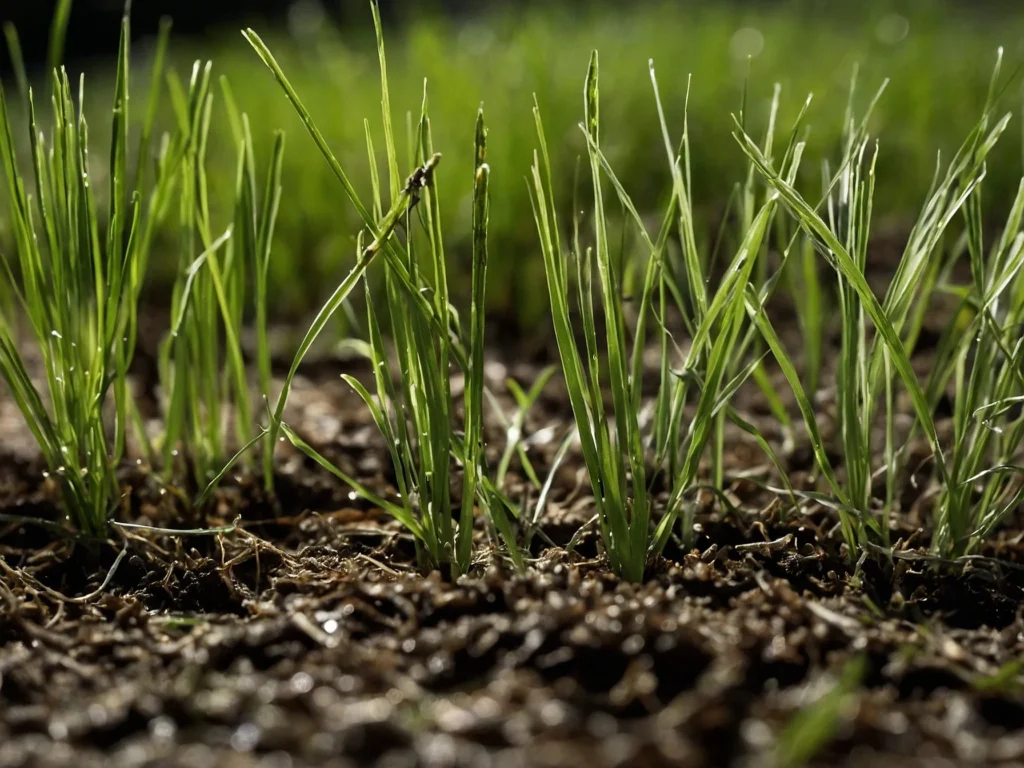Vinegar as a natural weed control method in the garden has become increasingly popular. But one question home gardeners often ask is, “does vinegar kill grass?” Specifically, they want to know if spraying vinegar directly onto grassy weeds or unwanted patches of lawn grass will permanently eliminate them.

This article comprehensively examines how vinegar affects grass and grass roots as an herbicide. It explores vinegar’s impact on surrounding flower beds, plants, seeds, and specific weeds. A comparison is made between vinegar and other homemade solutions like bleach and baking soda for killing grass. Proper dilution, mixing methods, and application techniques using vinegar for weed control are also covered. Finally, the article examines alternative natural grass and weed-killing options, environmental considerations, effects on soil health, and safety precautions when using vinegar in the garden.
How Vinegar Affects Grass and Grass Roots
When used as a natural herbicide, vinegar works by drying out and killing grass blades and damaging the grass plant’s root system. The acetic acid in vinegar is a desiccant that destroys the grass leaves and stems on contact.
It takes approximately two to four hours of direct exposure to horticultural vinegar concentrations between 5-20% for the grass blades to wilt and die thoroughly. However, the grass roots are often not destroyed right away.
It can take up to four weeks for the grass roots to completely die off after being treated with vinegar. The vinegar must soak down into the soil and remain in contact with the roots over an extended period to terminate them.
If the grass roots are not fully killed, the lawn or weeds can regenerate and regrow after a vinegar application. To prevent regrowth, the vinegar must penetrate the soil deeply enough to damage the root system below the surface.
Vinegar is often effective for spot-treating grass growing in sidewalk cracks and driveway seams. The confined space allows the vinegar to pool and penetrate the soil, increasing root contact.
Vinegar and Flower Beds
Using vinegar as a grass killer around valued ornamental plants or flower beds requires careful precautions. Vinegar can drift or leach onto nearby flowers, shrubs, trees and other desirable plants if not applied selectively to the grass.
The acid in vinegar does not discriminate between weed and plant. It can burn and kill any plants it comes into direct contact with. Precise application is key when using vinegar as a grass herbicide near prized vegetation.
An ideal solution is to use a foam paint brush, cotton swabs or a spray bottle set to stream mode to apply vinegar only to unwanted grass selectively. This prevents damage to plantings adjacent to grassy weeds. Timed applications when rain is not forecasted also helps keep vinegar localized to target areas.
Vinegar’s Impact on Plants, Seeds, and Specific Weeds
Vinegar is non-selective when used as an herbicide. It will kill any actively growing plant it touches, including ornamentals, vegetables and desirable grass. Vinegar does not differentiate between wanted and unwanted vegetation.
However, it can be used selectively by carefully targeting only the weeds and avoiding contact with preferred plants. Vinegar will also prevent seeds from germinating when applied directly to the soil, acting as a pre-emergent herbicide.
Specific types of vinegar may work better on certain weeds. For example, horticultural vinegar at 20% concentration is often more effective at controlling tougher perennial grassy weeds like quackgrass and Johnson grass than typical 5% household vinegar. Always check the vinegar’s acetic acid content and use the appropriate concentration to control the weeds.
Vinegar as a Grass Killing Solution and Comparison with Other Methods
Using vinegar to kill grass and weeds is an effective natural herbicide option for organic gardeners wishing to avoid synthetic chemicals. Acetic acid provides an alternative way to damage unwanted plants without harsh toxins.
However, vinegar may not always provide complete control. While it destroys the above-ground grass blades and sometimes the roots when applied repeatedly at full strength, vinegar does not always permanently eliminate grass as effectively as chemical herbicides containing glyphosate.
Repeated applications are often required with vinegar to kill off regenerating grass roots entirely. For most immediate and lasting grass control, glyphosate products tend to perform better, but come with environmental and toxicity concerns.
Bleach and baking soda are other homemade options than vinegar as makeshift grass killers. But they present drawbacks. Bleach is non-selective, kills soil microbes, and can cause environmental pollution. Baking soda must be applied at impractical quantities to damage grass.
Vinegar is a moderately effective DIY method for controlling grass and weeds, providing a natural alternative to risky chemical options. But it may require persistence to eradicate grass down to the root fully.
Vinegar Mixing, Dilution, and Weed Eradication
Properly diluting household vinegar with water is key to maximizing its herbicidal effectiveness on grass and weeds. The acetic acid concentration must be raised high enough to damage plants sufficiently, but not so high it damages the sprayer or applicator.
A typical guideline is a 1:1 vinegar to water dilution for household 5% vinegar. This raises the acetic acid concentration to a level that can adequately kill weeds. For tougher weeds, a 1:3 vinegar-to-water ratio using 20% horticultural vinegar may provide better control.
Always use protective gloves, goggles and appropriate spray equipment when applying high-concentration diluted vinegar. Avoid spraying on windy days to keep the vinegar solution on target plants.
Combining 1 tsp of eco-friendly dish soap per gallon of diluted vinegar solution helps the vinegar penetrate leaves and roots. The soap breaks down plant cuticle wax so the vinegar can contact plant tissue directly.
Repeated applications are often needed over weeks to months to fully eradicate weeds and grass roots with vinegar. Perennial grassy weeds may require frequent re-application to destroy their deep root systems. Be persistent, and vinegar can provide effective, natural weed control.
Natural Methods to Kill Weeds and Environmental Impact
For homeowners wishing to avoid chemicals, vinegar provides an alternative natural solution for controlling grass and weeds. But other eco-friendly options exist which can be compared to vinegar.
Physical removal, mulching, or smothering weeds with cardboard are non-toxic manual control methods. Solarization using black plastic to heat and kill weeds is another chemical-free technique.
Products like corn gluten meal or herbicidal soaps rely on natural ingredients to selectively inhibit weed seed germination or damage existing plants. Such organic options provide natural weed control with very limited environmental impact.
Unlike synthetic herbicides, vinegar, corn gluten and other natural treatments break down quickly in the soil without long-lasting toxicity or pollution issues. But products like vinegar may still require caution to prevent harm to valued plants and soil biology. Overall, natural weed control options are ideal for environmentally conscious gardeners.
Vinegar and Soil Health
Although vinegar provides a natural alternative to commercial herbicides, overuse may still impact soil health to some degree.
Vinegar’s high acidity can potentially lower soil pH with repeated high-concentration applications. It may take several re-applications to affect pH significantly, but frequent vinegar use could make soil more acidic over time if not monitored.
The acid in vinegar can also damage or kill beneficial soil microbes and fungi with excessive use. However, diluted vinegar applied selectively at recommended concentrations will likely have negligible effects on soil biology and chemistry.
Use only the lowest effective vinegar concentration on targeted weeds to prevent soil health issues. Test soil pH annually and re-balance as needed through liming. Avoid excessive use of vinegar as a herbicide, and rotate treatment areas to reduce soil impacts.
Vinegar and Safety Precautions
When using vinegar as an herbicide, it is critical to take safety precautions despite its natural composition. Concentrated acidity can cause eye and skin burns if handled improperly.
Always wear gloves, long sleeves and eye protection when mixing and spraying vinegar weed killer formulations. Avoid touching the solution, and thoroughly rinse any accidental skin contact immediately.
Do not ingest vinegar products; keep them clearly labeled and stored securely away from children and food items. Use caution when spraying vinegar to avoid unwanted contact with eyes, skin or other vegetation.
Follow all manufacturer safety guidelines, and calibrate sprayers to avoid excessive overspray. Consider spraying on calm days or using a shield to prevent vinegary mist from drifting. Exercise caution, and vinegar can be used responsibly as an organic grass and weed control product.
Conclusion
With its high acetic acid content, vinegar can provide an effective alternative to synthetic herbicides for controlling grass and weeds. It destroys plant tissue on contact, and repeated applications to roots can sometimes eradicate unwanted vegetation.
However, as a DIY grass killer, vinegar requires precision application to target weeds and avoid valued plants. It may also necessitate repeated use to destroy grass and weed roots, making it more labor
